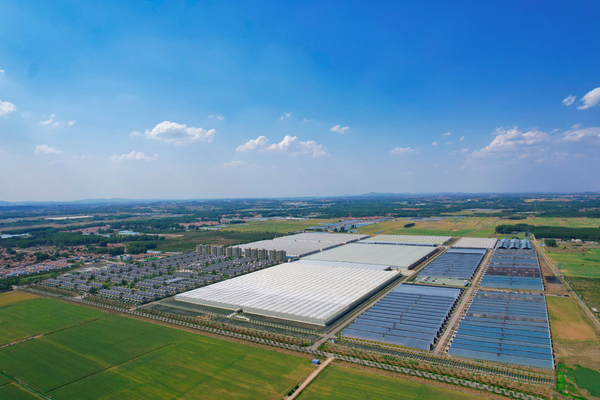Haoyu Group is one of China's best-known large-scale, modern agriculture companies. They produce a wide variety of products including snack tomatoes and roses. CEO Zhao of Haoyu Group previously talked about their snack tomatoes, and has now come back to talk about their roses.

"Our greenhouses for roses occupy a total surface area of about 20 hectares. We have 27 rose varieties, including such major varieties as Dummen Orange, French Meilland, Interplant, and Xilusi. In addition, we are currently testing more than 300 varieties. We put the roses through continuous testing to select the most suitable and trending varieties for the market. We also prepare new greenhouse extensions to increase production," said CEO Zhao. "Roses are very sensitive to changes in the micro-climate, so we have to adjust the roses to suit different micro-climates. Yunnan has a large number of rose plantations, which makes it easier to obtain and analyze large amounts of data. In north China the number of rose plantations is small and data is limited. That is why we have to go through a large number of tests by ourselves. We are currently setting up a new flower project in Tai'an City, Shandong. We will also plant roses, and we need a large number of tests to make sure we are well prepared."
"Red is a popular color for roses during a number of holidays including Valentine's Day. However, the growing number of younger consumers has an impact on market preferences. Orange and champagne-colored rose varieties gain popularity. White and pink varieties are in vogue as well. We mainly sell our flowers to Beijing, Shanghai, Guangzhou, and Hangzhou markets. Of course, we also suffer the impact of the pandemic. Distribution costs have gone up, and some markets have closed due to lockdown measures. Fresh flowers do not endure storage well, so these measures have a serious impact on sales. Flower companies in the Netherlands usually transport the fresh flowers in water bottles, but China is too large for this kind of transport. That would make the cost of transport excessive."
"Our plantation employs residents of nearby villages. Installation agriculture does not provide a lot of short-term profit, but in the long run greenhouse agriculture benefits the country and benefits the people. We have a long tradition of fresh-cut rose plantation. Some of the farmers plant roses, but they are not aware of plantation management concepts, and so they have difficulty controlling the product quality of their roses. Moreover, they are often behind in terms of popular flower varieties. Fresh flowers used to be sold all bundled together without attention to quality grading. We used the influence of Haoyu Group to stimulate developments in nearby flower plantations, so that the industry becomes more standardized, and product quality continuously improves. Together we can establish brands that raise profit levels in the industry. And because we hire locally, we also help solve income issues for families in the area. We help people work where they live," said CEO Zhao. "The government provides a lot of support for the development of greenhouse agriculture, so that highly-skilled laborers return to the countryside and build up agricultural industry there. Graduates and undergraduates enjoy preferential treatment in these projects. As for Haoyu Group, we construct high-standard dormitories for our employees. We also build excellent kindergartens and elementary schools in the villages near our greenhouses, so that the children of our employees can conveniently enjoy an education. Finally, we build canteens where residents of 65 and older can eat for free. In this way, we take care of the elderly and educate the young."
"Although we joined the agricultural industry rather late, we are always serious when it comes to agriculture," said CEO Zhao.
